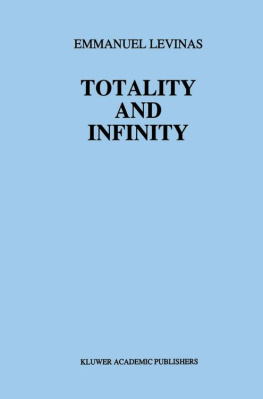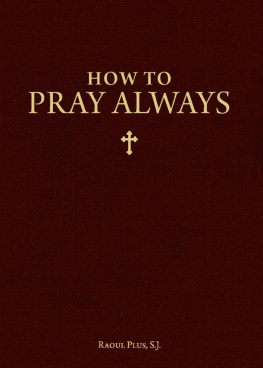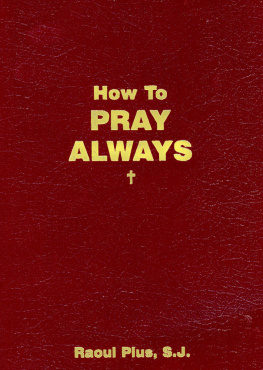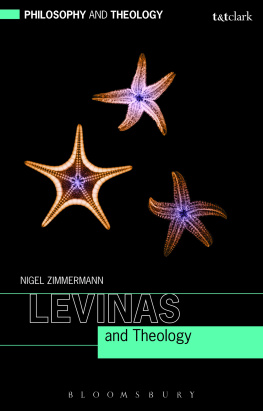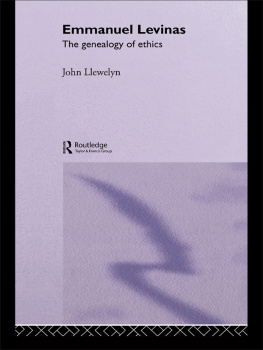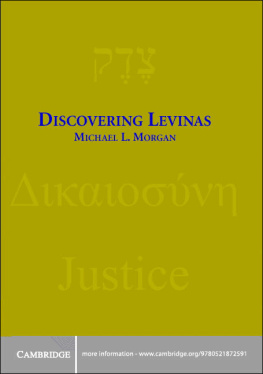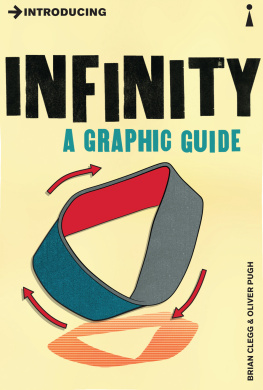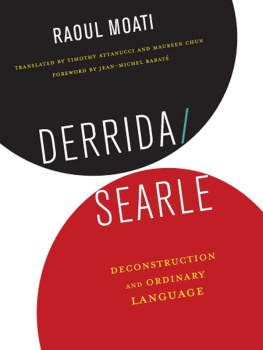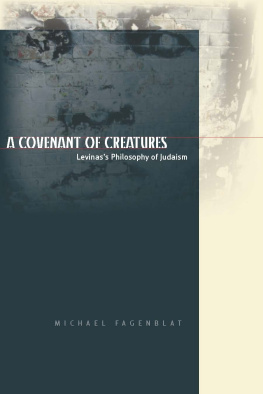Moati Raoul - Levinas and the Night of Being: A Guide to Totality and Infinity
Here you can read online Moati Raoul - Levinas and the Night of Being: A Guide to Totality and Infinity full text of the book (entire story) in english for free. Download pdf and epub, get meaning, cover and reviews about this ebook. year: 2017, publisher: Fordham University Press, genre: Religion. Description of the work, (preface) as well as reviews are available. Best literature library LitArk.com created for fans of good reading and offers a wide selection of genres:
Romance novel
Science fiction
Adventure
Detective
Science
History
Home and family
Prose
Art
Politics
Computer
Non-fiction
Religion
Business
Children
Humor
Choose a favorite category and find really read worthwhile books. Enjoy immersion in the world of imagination, feel the emotions of the characters or learn something new for yourself, make an fascinating discovery.

- Book:Levinas and the Night of Being: A Guide to Totality and Infinity
- Author:
- Publisher:Fordham University Press
- Genre:
- Year:2017
- Rating:3 / 5
- Favourites:Add to favourites
- Your mark:
- 60
- 1
- 2
- 3
- 4
- 5
Levinas and the Night of Being: A Guide to Totality and Infinity: summary, description and annotation
We offer to read an annotation, description, summary or preface (depends on what the author of the book "Levinas and the Night of Being: A Guide to Totality and Infinity" wrote himself). If you haven't found the necessary information about the book — write in the comments, we will try to find it.
Moati Raoul: author's other books
Who wrote Levinas and the Night of Being: A Guide to Totality and Infinity? Find out the surname, the name of the author of the book and a list of all author's works by series.
Levinas and the Night of Being: A Guide to Totality and Infinity — read online for free the complete book (whole text) full work
Below is the text of the book, divided by pages. System saving the place of the last page read, allows you to conveniently read the book "Levinas and the Night of Being: A Guide to Totality and Infinity" online for free, without having to search again every time where you left off. Put a bookmark, and you can go to the page where you finished reading at any time.
Font size:
Interval:
Bookmark:
LEVINAS AND THE NIGHT OF BEING
Levinas and the Night of Being
A GUIDE TO TOTALITY AND INFINITY
RAOUL MOATI
TRANSLATED BY DANIEL WYCHE
FORDHAM UNIVERSITY PRESS
New York2017
Copyright 2017 Fordham University Press
All rights reserved. No part of this publication may be reproduced, stored in a retrieval system, or transmitted in any form or by any meanselectronic, mechanical, photocopy, recording, or any otherexcept for brief quotations in printed reviews, without the prior permission of the publisher.
This book was first published in French as vnements nocturnes: Essai sur Totalit et infini, by Raoul Moati ditions Hermann, 2012.
This books publication was supported by a subvention from the University of Chicagos Visiting Committee to the Division of Humanities.
Fordham University Press has no responsibility for the persistence or accuracy of URLs for external or third-party Internet websites referred to in this publication and does not guarantee that any content on such websites is, or will remain, accurate or appropriate.
Fordham University Press also publishes its books in a variety of electronic formats. Some content that appears in print may not be available in electronic books.
Visit us online at www.fordhampress.com.
Library of Congress Cataloging-in-Publication Data is available online at http://catalog.loc.gov.
Printed in the United States of America
19 18 17 5 4 3 2 1
First edition
CONTENTS
, by Jocelyn Benoist
Perhaps the only thing as difficult as translating the work of Emmanuel Levinas is translating a book about Levinas. It goes without saying that Levinass prose, choice of technical terms, and so on are very much his own. Indeed, over the course of this translation project, more than one of my conversations with Raoul Moati would end with a sentence of the form, Yes, it is very strange in French too. Despite those difficulties, one of the greatest strengths of Moatis reading of Totality and Infinity here is his markedly deep insight into, and therefore faithfulness to, Levinass own style and its necessity to the latters overall project. But it is in turn for that reason that the greatest challenges that arose for me in translating Moatis vnements nocturnes: Essai sur Totalit et infini (2012) were ultimately raised by Levinass text.
Alphonso Lingis, in his translation of Totality and Infinity, made an admirable attempt to remain faithful to Levinass voice, and in so doing he has set the standard for English translations of most of the technical vocabulary and important turns of phrase. But despite those efforts, Levinass style can still sound odd even to English ears that are used to it and remains all the more difficult for those who are not. It is here that Ive faced the most daunting task of this project: navigating between a drive toward lucid and properly English prose and the necessity of remaining faithful not just to the content of the original but to the carefully chosen technical terms that populate these texts, however strange or unintuitive they may seem at first. My goal then has been to make Moatis text as fruitful and rewarding as possible to those who choose to take it up, by rendering it in a way that retains both his voice and that of Levinas but minimizes unnecessary obscurity by translating, rather than transliterating, the grammar, style, and vocabulary into English without betraying any technical necessity. If I have even begun to approach such a balance, then I consider my work here a success.
We have had to make several important choices about how to represent a number of technical terms, including when and when not to depart from Lingiss standardizations. Such terms are thus noted when they occur for the first time, and the French is included in brackets when it is clear that it will help with a distinction that would not be apparent in English. It is worth highlighting some of the more important instances here, and it should be kept in mind that all these choices were made after long and in-depth discussion with Moati.
First, in the original, each of the two crucial French terms for the Other and other, autrui and autre, appear in both capitalized and lower case versions, depending on an entire range of criteria particular to Levinass thought. This distinction doesnt exist in English, and so Lingis addressed this problem by rendering autrui as Other, and autre as other, with the approval of Levinas himself. As he says in an early note on this point, With the authors permission, we are translating autrui (the personal Other, the you) by Other, and autre by other. In doing so, we regrettably sacrifice the possibility of reproducing the authors use of capital or small letters with both these terms in the French text..
We have also decided to follow Lingis in the use of dwelling for the term demeure, the place that the subject inhabits, the place where he or she lives or resides in the full sense explicated by Levinas and here by Moati. This choice has the added bonus of allowing an implicit emphasis on the continuity of this concept with the verb form demeurer, to dwell or reside, but also to remain, to stay, and so on. For the sake of making the distinction between the two concepts clear, the English home has been reserved for the French maison.
Le moi appears as the I in Lingis, but I have departed from his usage, and this term is translated here the self and the separated self, when it appears as le moi separ.
The numerous variations on the term tre also provided some difficulty in attempts to distinguish them in English, although all instances of the word tre itself are rendered here simply as being. The term tant proved more of a challenge, but we have followed Lingis in rendering it as existent in all cases. Part of the difficulty there, however, comes from Levinass, and thus Moatis, use of the term xistant, which we have simply transliterated as existant, with an a rather than an e, as it appears in the French. In all Finally, we have distinguished existence from lxister, by transliterating the former as simply existence, and rendering lxister with existing, or sometimes to exist, depending on context.
Along with these issues of technical vocabulary, it should be noted that many of the sources that Moati refers to in this text are not as yet translated into English. Moati has made ample, and excellent, use of the three extant volumes of the newly published Oeuvres compltes, in which many of Levinass early writings are collected for the first time. In particular, Moati draws heavily on three pieces, Pouvoirs et origines, Parole et silence, and Lcrit et loral, all found in Parole et silence, volume 2 of the Oeuvres compltes. All original translations from these texts are my own, as noted at their respective first appearances in this book.
Finally, over the course of this translation project, Raoul Moati has chosen to rewrite certain passages of his own work, vnements Nocturnes, for this English version. Readers comparing the texts will easily spot certain sentences, and even entire paragraphs, that depart completely from the original French. Any such case is the result of a total rewrite on Moatis part, integrated into the text according to his instruction.
I thank Raoul Moati for the privilege of working on this project, Arnold Davidson for making Levinas clear where he had been obscure, my family for their support over the course of this work, and finally the members, past and present, of the Contemporary European Philosophy Workshop at the University of Chicago.
Next pageFont size:
Interval:
Bookmark:
Similar books «Levinas and the Night of Being: A Guide to Totality and Infinity»
Look at similar books to Levinas and the Night of Being: A Guide to Totality and Infinity. We have selected literature similar in name and meaning in the hope of providing readers with more options to find new, interesting, not yet read works.
Discussion, reviews of the book Levinas and the Night of Being: A Guide to Totality and Infinity and just readers' own opinions. Leave your comments, write what you think about the work, its meaning or the main characters. Specify what exactly you liked and what you didn't like, and why you think so.

